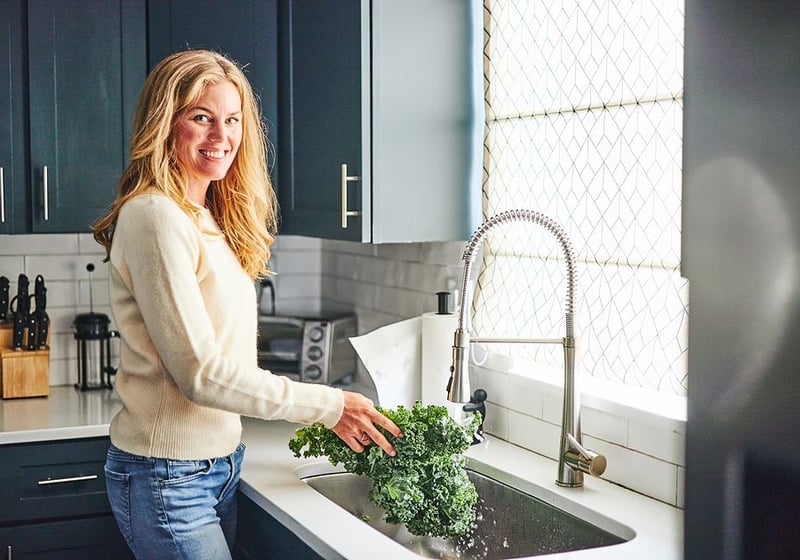
Does the word holistic strike you as a little woo-woo or hippy-dippy? Does it make you think about meditating in nature? Doing yoga in a room that smells of lavender? Making homemade granola with all organic ingredients?
Maybe your associations with the word holistic are more medical. Maybe holistic makes you think of approaching things naturally, identifying the root cause of an issue, and treating your body without immediately jumping into medication, surgery, or other serious medical interventions.
Holistic makes me think well-rounded and all-encompassing.
You may be wondering how this all fits into nutrition counseling. What does holistic nutrition counseling mean? What does it encompass? Is it something you should be looking into?
As a registered dietitian who practices holistic nutrition counseling and has seen the positive impact it can have on peoples’ lives, I am here to answer these questions and more.
In this article, I’ll help you understand what holistic nutrition counseling is and why it may be less woo-woo, more comprehensive, and more effective than you may think. I’ll define holistic, holistic nutrition, and holistic nutrition counseling. I’ll also explain what holistic nutrition counseling looks like and how to know if it’s right for you.
What Does Holistic Mean?
Let’s start with the basics and build from there.
A quick Google search will tell you that holistic has two meanings.
The philosophical definition is: “characterized by comprehension of the parts of something as intimately interconnected and explicable only by reference to the whole.”
Sounds pretty philosophical, right?
To make this more straightforward, holistic means comprehensive. It means zooming out and looking at the whole picture.
It acknowledges that any one piece of a puzzle alone is not enough, we need to address all of the pieces to get the full scope of what’s going on.
The medical definition of holistic is “characterized by the treatment of the whole person, taking into account mental and social factors rather than just the symptoms of a disease.”
I talk about this concept in my nutrition counseling sessions often.
You may be in tiptop physical shape, but if you are struggling mentally, emotionally, socially, or spiritually, your health will still suffer.
Health and wellness are not just about the physical, they are about balancing and optimizing all areas of your life.
What Is Holistic Nutrition?
Let’s add a layer here.
By now you can probably guess that holistic nutrition isn’t just about the food you eat.
Yes, as dietitians and nutritionists we want you to eat your fruits and veggies and get enough protein each day. However, we are also concerned with so much more than simply what goes into your body.
Holistic nutrition starts with the food. It starts with the basics including:
- What you eat
- When you eat
- How much you eat
It builds into concepts like:
- How balanced is your diet?
- Are you eating a variety of foods?
- Do you practice moderation?
However, these concepts are still just scratching the surface. Many dietitians dig into your relationship with food, with your body, and with exercise.
Since exercise has entered the discussion, exercise becomes part of the discussion around holistic nutrition, and branches us out into holistic health.
Do you exercise? How much do you exercise? What types of exercise do you do? What are your motivations for exercise? There are all factors to be considered.
From here the list continues to grow. We dive deeper into concepts including, but not limited to:
- Sleep
- Stress
- Mental health
- Mindfulness
- Self-care
What started as what you eat has suddenly become something much larger, much more comprehensive, and much more representative of your overall health instead of just your physical health.
What Is Holistic Nutrition Counseling?
We’ve reached the big question. How do these concepts come together in nutrition counseling?
All of the concepts listed above are on the table to discuss with your dietitian. You may start in one place and end in a completely different spot.
Together, you and your dietitian will work through some or all of these factors. Which are most important to you? Which are you willing to change? Which are the most pressing issues? Which will have the biggest impact on your life?
What you will see over time is that as you improve any one area of your health, others will improve as well. If you can improve your sleep, you may have fewer sweet cravings, more energy to exercise, and lower levels of anxiety. Changing one thing can change everything.
To take us back to the beginning, holistic nutrition counseling can also be used to address some medical concerns without jumping straight to medication, surgery, or other serious medical interventions.
I am not here to tell you not to work closely with your medical providers. However, I am here to tell you that by working with your dietitian to identify the root cause of an issue you are experiencing and adjusting your nutrition and other wellness practices, you may be able to improve your condition without diving into medications or surgeries.
What Does Holistic Nutrition Counseling Look Like?
The honest answer is that it looks different for everyone, and that’s the beauty of it.
Holistic nutrition counseling is personalized, unique, and complex. It starts with food, but ebbs and flows into many different areas. Each and every one of these areas is dependent on you and what you need.
How long you choose to work with your nutrition coach is also completely dependent on you and your needs.
This specific type of nutrition counseling is meant to meet you where you currently are. There aren’t standards you must meet to start holistic nutrition counseling. Your dietitian will work with you to improve your health no matter where you start.
Is Holistic Nutrition Counseling Right For You?
If you are looking to improve not only your nutrition but also your overall health, holistic nutrition counseling is right for you.
As I said, where you start isn’t anywhere near as important as where you want to end up. Holistic nutrition meets you where you are at.
You may be a trained chef or you may struggle to make pasta. Holistic nutrition counseling is right for you.
You may have access to fancy products in your grocery store or only have basic staples available. Holistic nutrition counseling is right for you.
You may be single and only responsible for your own nutrition or you may have a full family to feed and care for. Holistic nutrition counseling is right for you.
You may have serious medical concerns or you may just want to be a healthy person. Holistic nutrition counseling is right for you.
If you’re not quite sure that you’re ready to make changes to your eating, exercise, and other health behaviors right now, holistic nutrition counseling may not be for you at the moment.
For now, you can simply start to bring more awareness to what is blocking you from being your healthiest self and brainstorm ideas of how to work through these barriers.
Where To Go Next
If you started reading and were a little confused by the term holistic, I hope you feel more confident in your understanding of what holistic nutrition counseling is now.
If you’re still looking to learn more about what nutrition professionals do and how working with one may benefit you read: What Do Nutrition Coaches Do? Why You May Want to Work With One.
If you’re committed to the idea of improving your overall health through holistic nutrition counseling you can read more about how to find the best nutrition coach for you and how much personalized nutrition programs cost.
And finally, if you’re ready to drive right into holistic nutrition counseling, schedule a free consultation today!
Topics

Liz has been reading nutrition labels since she learned how to read. Growing up with severe peanut and tree nut allergies she learned that it’s important to know what you are putting into your body. She made her first big lifestyle change as a freshman in high school, when she decided to become a vegetarian. However, it wasn’t until she took a food class in Italy as part of a study abroad program in college that it clicked in her mind that she wanted to make food and nutrition her career. Liz graduated from Penn State University in 2015 with a bachelor's degree in Nutrition, as well as a bachelor's degree in Marketing. She completed her dietetic internship with Aramark in Philadelphia, and her master's degree at Northeastern University shortly after.




